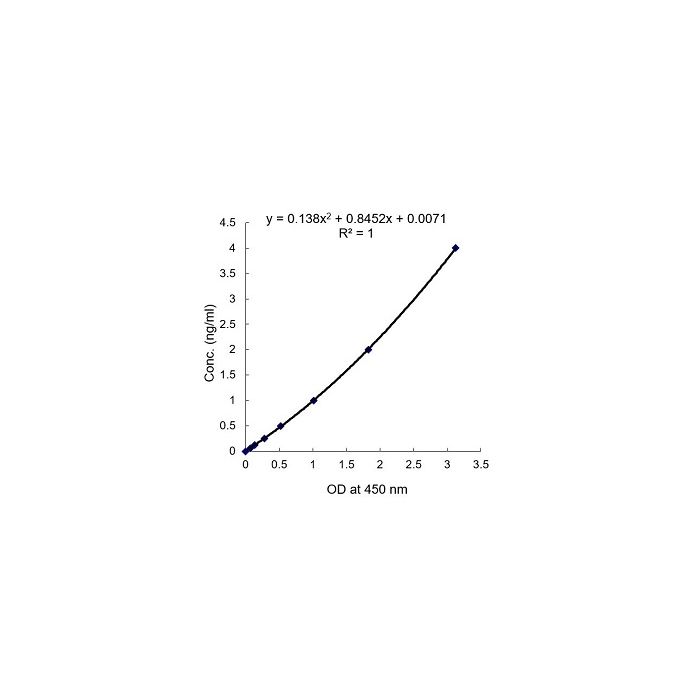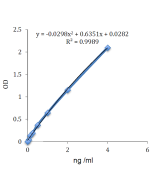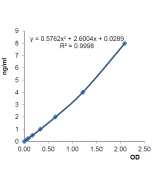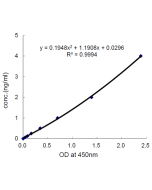Cookie Policy: This site uses cookies to improve your experience. You can find out more about our use of cookies in our Privacy Policy. By continuing to browse this site you agree to our use of cookies.
AdipoGen Life Sciences
Progranulin (human) ELISA Kit (mAb/mAb)

| Product Details | |
|---|---|
| Synonyms | Acrogranin; Epithelin Precursor; Glycoprotein of 88 Kda; GP88; Glycoprotein 88; Granulin Precursor; PC Cell-derived Growth Factor; PCDGF; Proepithelin; PEPI |
| Product Type | Kit |
| Properties | |
| Application Set | Quantitative ELISA |
| Specificity |
Detects human progranulin in cell culture supernatants, serum and plasma and allows the detection of Progranulin FTLD mutations. |
| Crossreactivity | Human |
| Quantity |
1 x 96 wells |
| Sensitivity | 60pg/ml |
| Range | 0.063 to 4ng/ml |
| Sample Type |
Cell Culture Supernatant Plasma Serum |
| Assay Type | Sandwich |
| Detection Type | Colorimetric |
| Other Product Data |
Uniprot link P28799: Progranulin (human) |
| Accession Number | P28799 |
| Shipping and Handling | |
| Shipping | BLUE ICE |
| Short Term Storage | +4°C |
| Long Term Storage | +4°C |
| Handling Advice |
After standard reconstitution, prepare aliquots and store at -20°C. Avoid freeze/thaw cycles. Plate and reagents should reach room temperature before use. |
| Use/Stability | 12 months after the day of manufacturing. See expiry date on ELISA Kit box. |
| Documents | |
| Manual |
 Download PDF Download PDF |
| MSDS |
 Download PDF Download PDF |
| Product Specification Sheet | |
| Datasheet |
 Download PDF Download PDF |
Progranulin (PGRN) is a widely expressed pluripotent growth factor that plays a role in processes such as development, wound repair and inflammation by activating signaling cascades that control cell cycle progression and cell motility. In addition, PGRN has also been linked to tumorigenesis. New cutting-edge publications have shown that progranulin might be a biomarker not only for FTLD but also for other types of Alzheimer‘s disease (AD). This new data even suppose the potential of progranulin to be a biomarker for MCI (Mild Cognitive Impairment), which would be a hallmark in AD research. Additionally, PGRN is described as a new ligand of TNF receptors and a potential therapeutic against inflammatory diseases like arthritis.
Mutations in PGRN have been found to be a common cause of familial frontotemporal lobar degeneration called FTLD. Since Progranulin has neurotrophic properties and most mutations are predicted to result in a heterozygous loss of gene expression, PGRN deficiency so-called haploinsufficiency is thought to cause neurodegeneration in these patients. GRN mutations are frequent causes of familial frontotemporal degeneration. Reduced progranulin levels in plasma or serum, constitute a reliable, cost-effective biomarker, suitable as a screening tool in patients with familial frontotemporal degeneration. The new mAb-based human Progranulin ELISA Kit has been thoroughly validated and compared to the standard pAb-based ELISA Kit from AdipoGen (Prod. No. AG-45A-0018Y). With this new ELISA Kit, levels below 50 ng/ml are strongly suggestive of GRN mutations. In a validation on 191 patient samples, confirmed by a molecular gene analysis, the new kit provided a sensitivity and specificity of 100% for detecting FTLD mutations.








